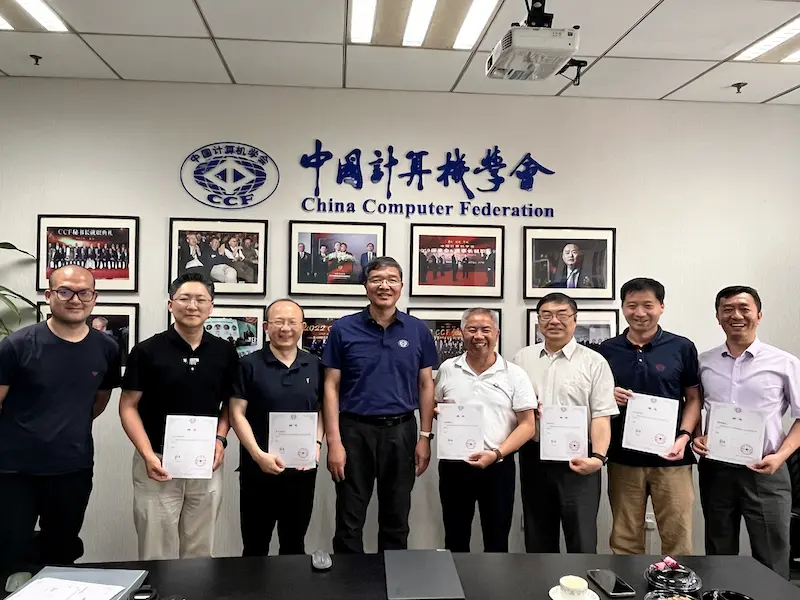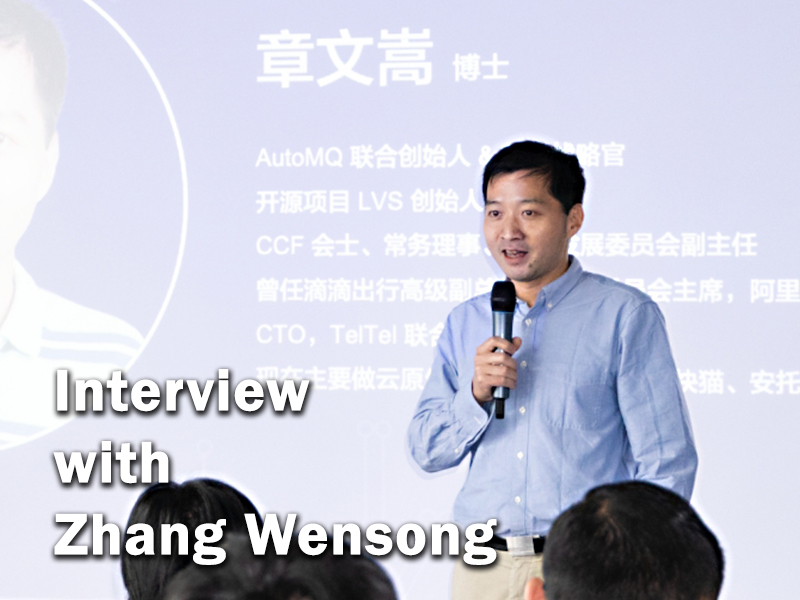- Zhang Wensong, a renowned figure in China’s open-source community and one of the six key open-source protagonists in the country, shares his extensive experience and insights on the evolution of technology and the future of data streaming with BTW Media.
- Zhang Wensong discusses the technological innovations driving the data infrastructure ecosystem, the significance of open-source principles, and his vision for cloud-native data streaming solutions.
Recently, we had the privilege of arranging an interview with Zhang Wensong, one of China’s renowned “six men of open-source.” Zhang Wensong has an extensive background in technology and industry leadership. He serves as the deputy director of the Open-Source Development Committee and is a fellow and executive member of the China Computer Federation (CCF). He is also a developer of the Linux kernel and the founder and primary developer of the famous Linux clustering open-source project, LVS (Linux Virtual Server). Currently, he is a partner at Hillhouse Capital, and has previously held positions as senior vice president and chairman of the Technology Committee at Didi, vice president and CTO of Alibaba Cloud, Deputy Secretary-General of CCF, Chief Scientist and Co-founder of TelTel, and associate professor at the National University of Defense Technology.
Zhang Wensong founded the LVS open-source project in May 1998. Since 2003, the LVS code has been included in the official Linux kernel and has been widely adopted globally. Over the past two decades, he has been a driving force in promoting open-source development in China, earning accolades such as the “CCF Distinguished Engineer Award,” “Outstanding Contribution to Open Source Award,” and being named one of the “Top Open Source Leaders in China.” Additionally, Zhang Wensong is the co-founder and CSO of AutoMQ, so in this interview we discussed a lot about the technical details and strategies of AutoMQ.
The Genesis of LVS
“It was gratifying to see how the framework I developed 26 years ago is still in use today, even by major companies like Google.”
Zhang Wensong, co-founder and CSO of AutoMQ
In our interview, Zhang Wensong revealed the story behind the creation of LVS. “I began the LVS open-source project in May 1998 during my time as a student,” he shared with BTW Media. At that time, the internet was still in its infancy, and there were no solutions for load balancing in the Linux kernel. Zhang Wensong found this a fascinating challenge and decided to develop a solution. “It took me about two weeks to create a prototype, which I then released to the Linux community,” he explained.
He went on to describe the positive response from the community. “I announced the software on the Linux Kernel Mailing List, and the feedback was encouraging,” Zhang Wensong recalled. Many users integrated LVS into their applications, and over time, the project gained traction. “It was gratifying to see how the framework I developed 26 years ago is still in use today, even by major companies like Google,” he added.
Adapting to technological shifts
“I feel fortunate to have witnessed and contributed to such substantial shifts in technology.”
Zhang Wensong, co-founder and CSO of AutoMQ
Zhang Wensong’s career has spanned over two decades of significant technological advancements. Reflecting on his journey, he mentioned, “I feel fortunate to have witnessed and contributed to such substantial shifts in technology.” His work with the Linux kernel and his role in Alibaba, where he led the development of software infrastructure for e-commerce, highlight his adaptability.
In our discussion, Zhang Wensong emphasised the importance of revisiting system designs in response to new requirements. “The principles of designing operating systems and distributed systems are similar to those in cloud computing,” he noted. He explained that understanding requirements and making design trade-offs are crucial for innovation and system performance.
AutoMQ and the future of data streaming
“We believe the future of data streaming is cloud-native. Traditional tools like Apache Kafka, while excellent, were designed for bare-metal environments and don’t fully leverage cloud-native benefits.”
Zhang Wensong, co-founder and CSO of AutoMQ
As the co-founder and Chief Strategy Officer of AutoMQ, Zhang Wensong has turned his attention to cloud computing and messaging middleware. He outlined AutoMQ’s vision for data streaming: “We believe the future of data streaming is cloud-native. Traditional tools like Apache Kafka, while excellent, were designed for bare-metal environments and don’t fully leverage cloud-native benefits.”
He elaborated on how AutoMQ’s solutions differ from competitors. “AutoMQ’s cloud-native architecture offers dynamic scalability, resilience, and seamless integration with other cloud-native tools,” Zhang Wensong explained during the interview. This approach, he believes, delivers superior performance and cost-efficiency.

Innovations and the broader data infrastructure ecosystem
One of the key innovations at AutoMQ is the decoupling of durability from traditional Kafka architectures. Zhang Wensong explained how AutoMQ’s approach saves on storage costs and improves efficiency. “By offloading durability to cloud storage services like EBS and S3, we avoid unnecessary data replication and reduce latency,” he said.
He also discussed the integration of streaming data into data lakes. “The industry is moving towards a shared-storage architecture,” Zhang Wensong noted. By using formats like Delta Lake and Iceberg, AutoMQ aims to facilitate seamless data storage and analysis across different sources, which he sees as the future of data analytics.
The spirit of open-source
“Open-source is a powerful tool for learning and improvement.”
Zhang Wensong, co-founder and CSO of AutoMQ
In our conversation, Zhang Wensong reflected on the principles of open-source that have guided his career. “Open-source is a powerful tool for learning and improvement,” he shared with BTW Media. He emphasised how open-source projects allow individuals to build on existing systems and contribute to their enhancement.
For companies, Zhang Wensong sees open-source as a strategic approach to customer engagement. “It’s an efficient way to reach users and build trust, as it often leads to paid services for additional support,” he explained.
Zhang Wensong’s journey from developing LVS to leading AutoMQ offers valuable insights into the evolution of technology and the future of data streaming. His experiences and perspectives highlight the impact of innovation and open-source. A special thank you to Zhang Wensong for sharing his story and expertise with BTW Media.

